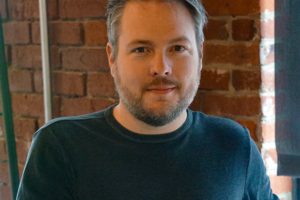
Rhabit is currently residing in Ascender’s coworking space, so I am lucky to be able to interact with Kevin and his team on a daily basis. It also helps that Ascender uses Rhabit for talent building and retention. The first thing that strikes you about Kevin is his southern charm, even though he is now residing in Pittsburgh. The second thing that strikes you is that he wants to talk to you on any subject from soccer to politics to the latest antics of his child. This is probably one of the reasons he founded a human behavior company and wants to build a business. During this discussion, I was able to get him to talk to me about Rhabit.
What is your business?
We are a B2B software company that plugs into the people operations of a company, specifically in the talent space. Our business is how to change and reinforce human behavior to make people more effective and happier in their worklife.
How did you come up with your idea?
We (myself and co-founder, Alexander) were working in talent management consulting and realized that there is an incredible need in the market. There are a lot of traditional approaches, tools, and solutions out there, but no one would say what was working well and if anything was effective.
Furthermore, there are modern technology solutions and there is a lot of compelling research into what and how to change people. The problem was that there was no marriage between technology and research; there were lots of new tools, but the solutions were coming from people who did not understand the problem or the research.
What is your goal or vision?
We’ve had some great results with smaller companies ranging from 10 to 100 employees in our first year, so our goal for 2018 is to find one early adopter, enterprise-level client. Our software is designed to grow at scale, and we want to find a partner who wants to be a trend setter for talent and culture. As the software proves out, we want to go to market at large and put our fingerprints on talent management.
Did you picture yourself doing what you are doing now?
If you asked the question to my mom she would tell you that I’ve always been incredibly independent and that she’s not surprised at all that I am doing my own thing.
Looking back, I shifted from being really into tech and having very technical roles to becoming more and more product focused because it gave me a creative outlet in addition to technical challenges. This drove me towards software product management, and then I think anyone who wants to ultimately push the envelop and make something truly new in the market has to be empowered to innovate – and that empowerment comes easiest when you build a business.
Why did you choose Ascender?
Early on in our journey, we spent time learning about the different resources available, and discovered Ascender’s Boot Camp in 2017. We went through the bootcamp which was a great process getting into the nitty gritty – how to start a business, build a team, developing processes, creating an organization, all the things that make you a business.
Our story could end right here, because we didn’t get picked for the incubator program. However, we dug in and went right back to work. What was cool is that Stephan (Entrepreneur in Residence) wanted to mentor us and keep us going forward, so we met with him bi-weekly and worked like dogs to show progress. After showing progress, we were invited into the incubator program.
Being at Ascender added legitimacy to our business by having a formal space, program and advisor. It’s a great way to get a structure and discipline as a first time founder.
Do you have any detractors?
If you don’t have haters, are you being compelling or being effective? Some things are worth having friction over. Something you gain from being an entrepreneur after being in the workforce for a few years is that as you get older, you break the friction apart and look for the value – really think about it and see if there’s an opportunity for growth for yourself. What ultimately matters though is who loves you, and that needs to be your customers, team and investors. This is what you should focus on, and anything outside of that is just a meaningless distraction.
What advice would you give to people starting out?
Do it. Build a business. Ideas are useless. You need to figure how to make your idea a reality even if it is rough, clunky and dirty. That is where the learning is in starting up, it’s in the manifesting. Pushing yourself to build things, build teams, build process, build relationships – execution is everything.
Sometimes to do new cutting-edge stuff, you need to take the risk and do it yourself, and you are not getting permission from people bought into the older way of doing stuff. You need the freedom to fail.
What is your one (or many) lesson learned?
Underestimating the scale and vastness of the market. Really getting a firm grasp on the extraordinary size and scale of different markets is actually a hard thing to really understand until you dig in. One lesson that was more validated than learned I think – is you need to dedicate so much time and effort into understanding competitors and customers in order to drive product features. Customers will tell you so much and will really light the way, but it’s a relationship you have to work diligently and thoughtfully to build real, authentic relationships rich with the trust you’ll need in order really understand your customer through and through – and I think people can under appreciate the importance of making this a priority when they already have a clear vision for what they want to make.
To learn more about Rhabit, please visit www.rhabit.co.


